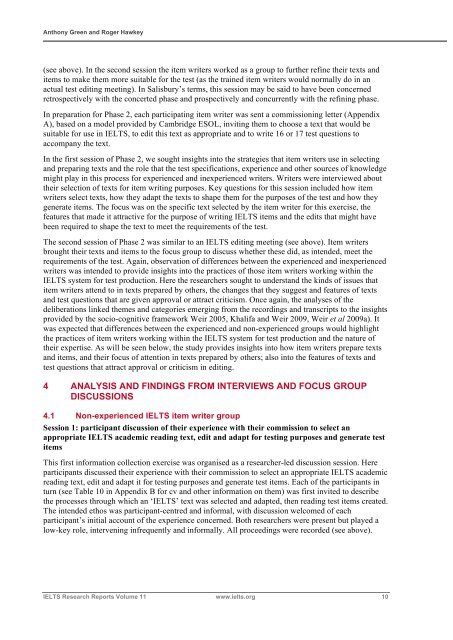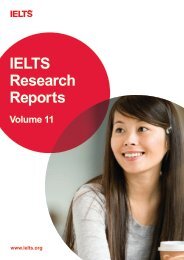An investigation of the process of writing IELTS Academic Reading ...
An investigation of the process of writing IELTS Academic Reading ...
An investigation of the process of writing IELTS Academic Reading ...
Create successful ePaper yourself
Turn your PDF publications into a flip-book with our unique Google optimized e-Paper software.
<strong>An</strong>thony Green and Roger Hawkey<br />
(see above). In <strong>the</strong> second session <strong>the</strong> item writers worked as a group to fur<strong>the</strong>r refine <strong>the</strong>ir texts and<br />
items to make <strong>the</strong>m more suitable for <strong>the</strong> test (as <strong>the</strong> trained item writers would normally do in an<br />
actual test editing meeting). In Salisbury’s terms, this session may be said to have been concerned<br />
retrospectively with <strong>the</strong> concerted phase and prospectively and concurrently with <strong>the</strong> refining phase.<br />
In preparation for Phase 2, each participating item writer was sent a commissioning letter (Appendix<br />
A), based on a model provided by Cambridge ESOL, inviting <strong>the</strong>m to choose a text that would be<br />
suitable for use in <strong>IELTS</strong>, to edit this text as appropriate and to write 16 or 17 test questions to<br />
accompany <strong>the</strong> text.<br />
In <strong>the</strong> first session <strong>of</strong> Phase 2, we sought insights into <strong>the</strong> strategies that item writers use in selecting<br />
and preparing texts and <strong>the</strong> role that <strong>the</strong> test specifications, experience and o<strong>the</strong>r sources <strong>of</strong> knowledge<br />
might play in this <strong>process</strong> for experienced and inexperienced writers. Writers were interviewed about<br />
<strong>the</strong>ir selection <strong>of</strong> texts for item <strong>writing</strong> purposes. Key questions for this session included how item<br />
writers select texts, how <strong>the</strong>y adapt <strong>the</strong> texts to shape <strong>the</strong>m for <strong>the</strong> purposes <strong>of</strong> <strong>the</strong> test and how <strong>the</strong>y<br />
generate items. The focus was on <strong>the</strong> specific text selected by <strong>the</strong> item writer for this exercise, <strong>the</strong><br />
features that made it attractive for <strong>the</strong> purpose <strong>of</strong> <strong>writing</strong> <strong>IELTS</strong> items and <strong>the</strong> edits that might have<br />
been required to shape <strong>the</strong> text to meet <strong>the</strong> requirements <strong>of</strong> <strong>the</strong> test.<br />
The second session <strong>of</strong> Phase 2 was similar to an <strong>IELTS</strong> editing meeting (see above). Item writers<br />
brought <strong>the</strong>ir texts and items to <strong>the</strong> focus group to discuss whe<strong>the</strong>r <strong>the</strong>se did, as intended, meet <strong>the</strong><br />
requirements <strong>of</strong> <strong>the</strong> test. Again, observation <strong>of</strong> differences between <strong>the</strong> experienced and inexperienced<br />
writers was intended to provide insights into <strong>the</strong> practices <strong>of</strong> those item writers working within <strong>the</strong><br />
<strong>IELTS</strong> system for test production. Here <strong>the</strong> researchers sought to understand <strong>the</strong> kinds <strong>of</strong> issues that<br />
item writers attend to in texts prepared by o<strong>the</strong>rs, <strong>the</strong> changes that <strong>the</strong>y suggest and features <strong>of</strong> texts<br />
and test questions that are given approval or attract criticism. Once again, <strong>the</strong> analyses <strong>of</strong> <strong>the</strong><br />
deliberations linked <strong>the</strong>mes and categories emerging from <strong>the</strong> recordings and transcripts to <strong>the</strong> insights<br />
provided by <strong>the</strong> socio-cognitive framework Weir 2005, Khalifa and Weir 2009, Weir et al 2009a). It<br />
was expected that differences between <strong>the</strong> experienced and non-experienced groups would highlight<br />
<strong>the</strong> practices <strong>of</strong> item writers working within <strong>the</strong> <strong>IELTS</strong> system for test production and <strong>the</strong> nature <strong>of</strong><br />
<strong>the</strong>ir expertise. As will be seen below, <strong>the</strong> study provides insights into how item writers prepare texts<br />
and items, and <strong>the</strong>ir focus <strong>of</strong> attention in texts prepared by o<strong>the</strong>rs; also into <strong>the</strong> features <strong>of</strong> texts and<br />
test questions that attract approval or criticism in editing.<br />
4 ANALYSIS AND FINDINGS FROM INTERVIEWS AND FOCUS GROUP<br />
DISCUSSIONS<br />
4.1 Non-experienced <strong>IELTS</strong> item writer group<br />
Session 1: participant discussion <strong>of</strong> <strong>the</strong>ir experience with <strong>the</strong>ir commission to select an<br />
appropriate <strong>IELTS</strong> academic reading text, edit and adapt for testing purposes and generate test<br />
items<br />
This first information collection exercise was organised as a researcher-led discussion session. Here<br />
participants discussed <strong>the</strong>ir experience with <strong>the</strong>ir commission to select an appropriate <strong>IELTS</strong> academic<br />
reading text, edit and adapt it for testing purposes and generate test items. Each <strong>of</strong> <strong>the</strong> participants in<br />
turn (see Table 10 in Appendix B for cv and o<strong>the</strong>r information on <strong>the</strong>m) was first invited to describe<br />
<strong>the</strong> <strong>process</strong>es through which an ‘<strong>IELTS</strong>’ text was selected and adapted, <strong>the</strong>n reading test items created.<br />
The intended ethos was participant-centred and informal, with discussion welcomed <strong>of</strong> each<br />
participant’s initial account <strong>of</strong> <strong>the</strong> experience concerned. Both researchers were present but played a<br />
low-key role, intervening infrequently and informally. All proceedings were recorded (see above).<br />
<strong>IELTS</strong> Research Reports Volume 11 www.ielts.org 10

















